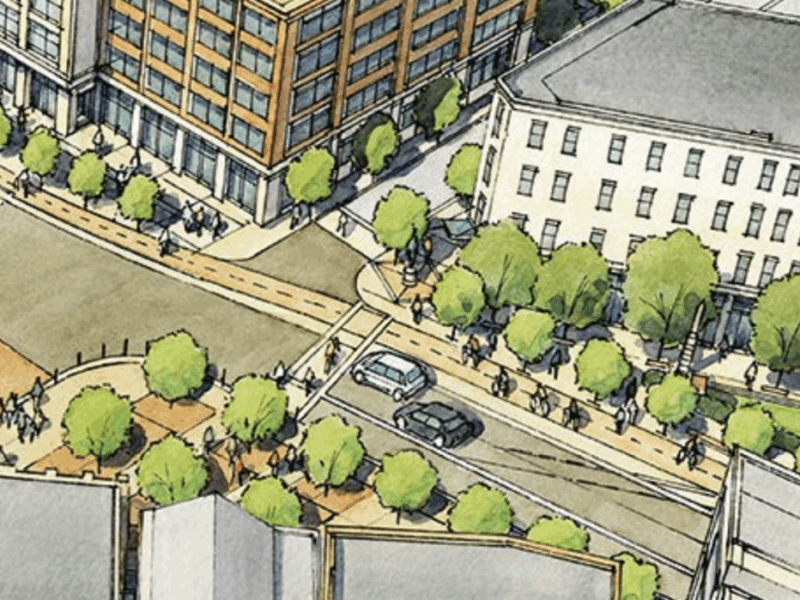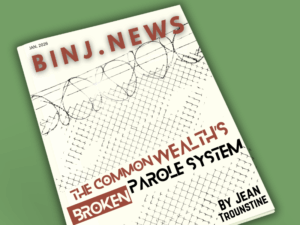Rendition of proposed Union Square development via City of Somerville Union Square Neighborhood Plan.
Residents vent on issues related to Union Square and other development
As a major initiative for 2019, the team at the Boston Institute for Nonprofit Journalism (BINJ), in collaboration with partners at DigBoston, Somerville Media Center (SMC), and various other outlets, is focusing on identifying and reporting critical stories in the City of Somerville.
To that end, we have been leading journalism workshops at SMC, including some with high school students, and in February BINJ turned out more than 100 Somerville residents and active community members to the ONCE ballroom on Highland Ave to converse with area journalists about issues they think need more coverage. The information these participants provided has already seeded articles and will continue to bear fruit over the coming months.
In addition to our follow-ups, we have transcribed all of the presentations given at ONCE. It’s a lot to chew on, so for the purpose of reporting back we parsed sentiments of the participating Somervillians into the following categories (many of which overlap at multiple intersections):
- Neighborhoods, transit, and accessibility
- Union Square and other development
- Low-income residents and affordable housing
- Immigrant communities
- Trees and the environment
- Arts, artists, and artisans
In addition to reports that stem from the February meetup, over the coming weeks we will also publish words and ideas that stood out at the summit. This week, we get into excerpts from various testimonies related to Union Square and other development.
Bill Cavellini, Union Square Neighborhood Council
One-point-five billion dollars. Fifteen acres. Two-million four-hundred thousand square feet. Over 15 years. It deserves some coverage. It’s gotten some, it needs some more. I’m talking about Union Square redevelopment.
I’m the co-chair of the Union Square Neighborhood Council, but my original involvement was through Union United. Which is a coalition of organizations, trade unions, and neighborhood groups. But the primary group were the Welcome Project, [Community Action Agency of Somerville], and the Somerville Community Corporation. Union United’s been in existence for five years; we have been in the street as much as we have been in the halls of decision-making and we appreciate the coverage that we’ve gotten.
We are in the midst of negotiations with a developer from out of town, from Chicago, that stands to make millions of dollars of profit. It’s time for Somerville to get a piece of the pie. Jobs, housing that’s affordable to long term residents. We’re tired of families having to leave. These are the stories that should be told. The individual ones and the group ones.
Elaine Koury, Somerville resident
Somerville is the victim of a hostile takeover by developers … whose motive obviously is to make money. They are changing the face of our town.
The mayor still invites development and says, every chance he gets, that if you want to build, come to Somerville. This development has fueled runaway real estate prices so that 17.8% of Somerville renters pay 50% or more of their income on rent.
There has been and there continues to be wonderful work around affordable housing, but there has not been nearly enough around market intervention. We need to stop the raging locomotive that is running us down. This is not a story, this is an investigative reporting series.
Ann Camara, Union Square Neighborhood Council
We’re working on everything … Any project that you have, come bring it to us, we will help you and we need your input and we need your help. We’re working with development for affordable, really affordable housing and jobs and training, sustainability, green space. I am also a member of Union United; if you need a voice, please join Union United. It’s someplace that you can have a voice, it’s organized and it fights for the right things.
Matt Lavallee, Somerville Free Press
I’ve been doing a deep dive into [the] campaign finances of our mayor, Joe Curtatone. I basically downloaded the whole database of contributions to [the] Curtatone campaign since 2010, which is something that anybody can get from the Office of Campaign and Political Finance, but the data that’s in it is wicked sloppy. So I’ve been, for the last month or so, looking through to find all the connections between different people and parties [and to] fix everybody’s misspellings of their own names in there. To find out who is whose mother in law … there are a lot of cases where an executive from some company or another will give $1,000 to the mayor, and then several people with the same name and address will also give a lot of money to the mayor on the same day. Which is not illegal, but it does make you wonder.
There’s two reasons you might want this information—one of them is if you don’t care about campaign finance but you are in the market for an out-of-town, well-moneyed developer of real estate, a management company for apartments, somebody who owns a lot of real estate around town. If you’re interested in some heavy equipment rentals, somebody to put up a fence, construction firms of all sorts.
Another reason is if you think that the office of the mayor and boards appointed by the mayor are people in a unique position of power to mediate the relationship between for-profit companies and developers [and to build the] political environment in which we live in the city, you might be really interested in who it is that sees fit to give this mayor [thousands of] dollars a year to run generally with no opponent.
A Somerville Community Summit Follow-Up Meeting will be held on Saturday, April 27 from 12 – 2pm at the Somerville Media Center, 90 Union Square, Somerville. Hosted by the Boston Institute for Nonprofit Journalism, DigBoston, and the Somerville Media Center. For more information, go to: facebook.com/events/583649248783693/.
Transcription by Spencer Walter.








